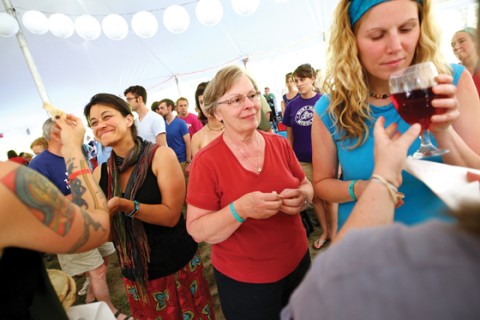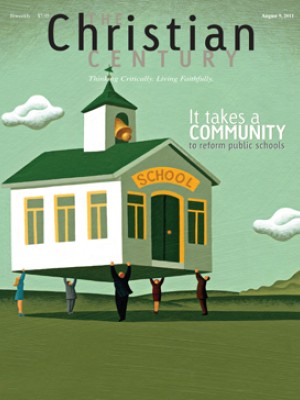Camp meeting: At the Wild Goose Festival

A group of 20 white folk sat at the feet of African-American storyteller Melvin Bray as he explored "How Now Shall Wild Goosers Live?" It was the last day of the Wild Goose Festival, which brought together nearly 1,700 mainline Christians, emerging-church types and social justice activists for four days of art, music, worship, workshops and conversation at Shakori Hills in North Carolina's Piedmont region.
Bray recited the story of how David attracted the outcasts of Israel to the wilderness, where he was hiding from Saul. Those outcasts, Bray said, were something like the group of "evangelical refugees," gays and lesbians and activists who were attending the festival. "All these men and women who've been exiled . . . these men and women who've been told they don't have any place," said Bray—"I imagine there were a few LGBTQ in the mix, because they didn't have a voice in Israel, they weren't part of the community. They find refuge with him, they find safety with him, they build this egalitarian community with him, with ideals about how we should live with one another."
Read our latest issue or browse back issues.
The wild goose is a Celtic symbol for the Holy Spirit. As some observers see it, the Wild Goose Festival is part of a movement of the Spirit in which doors are being blown off churches so that people mix across races, sexualities, social classes, cultures and even religions—a movement that is arising not in spite of but because of the decline of mainline, predominantly white, churches.
"It's good to be here with you, and I hope you start some kind of movement," said Karin Bergquist as her band, Over the Rhine, prepared to play. Like all the performers and speakers at the festival, Over the Rhine played for free, wanting to be part of a Christian festival that is more about sharing money than spending it.
Punctuated by moments of intense reflection, Wild Goose was a weekend of fun and free spirits, as amateur musicians circled up to play, beer flowed from a local brewery, Frisbees soared and people lingered around campfires into the early morning hours. The festival was sponsored by more than a dozen organizations, including Thomas Nelson publishing company, Sojourners and World Vision, and the organizing team was led by Irish peace activist Gareth Higgins.
Diana Butler Bass, an Episcopalian author who studies decline and renewal in the mainline church, spoke of a "new spiritual awakening" afoot in which American Christians are being profoundly altered by contact not only with Christians from other parts of the globe but also with Hindus, Buddhists and nature spiritualists. Citing the late church historian William McLoughlin, Bass said this new religious syncretism might constitute the nation's Fourth Great Awakening.
Paul Knitter, professor of world religions at Union Theological Seminary, suggested that pluralism is calling Christians to greater faithfulness. "Jesus was principally concerned with witnessing to the reign of God," he said. "Jesus was not as Christocentric as a lot of Christians are. Jesus is the way that is open to other ways. Pluralism becomes part of the Good News. It's Good News when you can learn from others. It's bad news if God is only on your side. Inclusion is your dogma."
During a panel discussion on sexuality and justice, Episcopal priest Paul Fromberg said the LGBTQ battle for equality is a big part of this awakening. "God has been setting queer people free in the church to change everything," he said. "None of us are free until everybody is free."
The Wild Goose Festival also featured a Native American sweat lodge where people squeezed into a small tent for a hot, intense period of communal prayer.
"I believe that the kingdom of God will be here, and I look to Native Americans as a model for how it will be here," said Karen Barletto of Norfolk, Virginia, during a session with Richard Twiss, a Sioux pastor and activist from South Dakota. "A lot of us are unlearning our Christian ways. The beauty of this festival is that we're opening up to the idea that there isn't just one authoritative way."
As Soong-Chan Rah sees it, change on a grand scale is inevitable. One of the few evangelicals on the Wild Goose speaking roster, Rah teaches evangelism at North Park Theological Seminary, an Evangelical Covenant school in Chicago.
Rah spoke of the church's escape from Western cultural captivity, citing statistics that show the fastest growing traditions, Baptist and Pentecostal, have large numbers of minorities, while numerically declining traditions—such as the Lutherans, Congregationalists and Methodists—do not. Rah said the rising influence of black, Latino and Asian Christians is a good thing, because the American church currently "reflects more Western and white cultural values than it does the values of the scripture."
But the festival was much more successful at attracting gays and lesbians and even people who don't claim to be Christian than it was at attracting ethnic minorities. Bray picked up on that fact, joking about a sandwich board seen throughout the festival that had the letters godisnowhere, forcing the reader to decide whether it says "God is nowhere" or "God is now here." It might say, "God, is snow here?" Bray said, "because all I see is white people."
Over at the Plant with Purpose booth, Colin Richard talked of working with farmers in developing countries, whose ways of using human labor instead of technology and of using natural building materials like mud and straw could help the U.S. deal with problems of unemployment, obesity and pollution.
Mainline churches have had success in building connections to social movements and in some cases to people of other faiths. A bridge that has been harder to build is one that connects to a generation born outside the church—young people interested in spirituality but allergic to organized religion. Nadia Bolz-Weber, founding pastor of House for All Sinners and Saints in Denver, described how young city dwellers have an indigenous culture that requires them to "culturally commute" in order to attend most mainline churches. They won't be attracted by flashy worship bands or famous preachers or the prosperity gospel, she said. They want honest expression through art or conversation.
"If I suspect you are marketing to me, I will resent you," she said. "We're anti-excellence, pro-participation," she said.
But Bolz-Weber bristles a bit when people call her authentic. "I hate that word authenticity," she said. "Wow, the bar's high in the church. If you're not pretending to be someone else and not lying to people, you're like this remarkable leader in the church."
Bolz-Weber said her denomination, the Evangelical Lutheran Church in America, has recognized that it doesn't know how to reach young adults and has been allowing seminarians to bypass typical internships and initial church assignments to plant their own churches while still in seminary. "My denomination saw who I was as a gift rather than a burden," she said.
But Wild Goose attracted its fair share of cynics about the church. "I'm beginning to think that Christianity at an institutional level is a complete failure," said Gayle Evers, a 55-year-old Texan raised in the Church of Christ, married in the Catholic Church, employed in a Methodist finance office and a former student at a Quaker seminary. "I am searching for Christians who believe we're called to live sacrificially. . . . I am here because I have become disillusioned with the power and the hierarchy."






